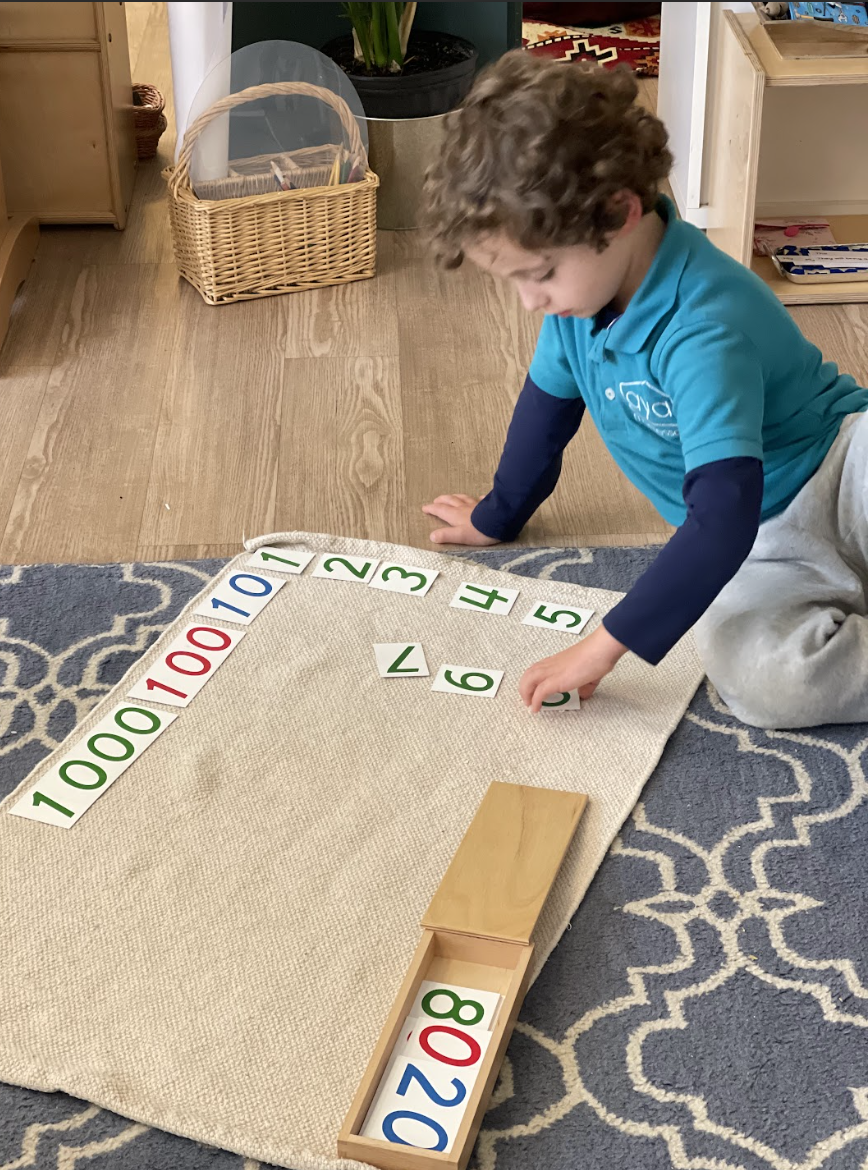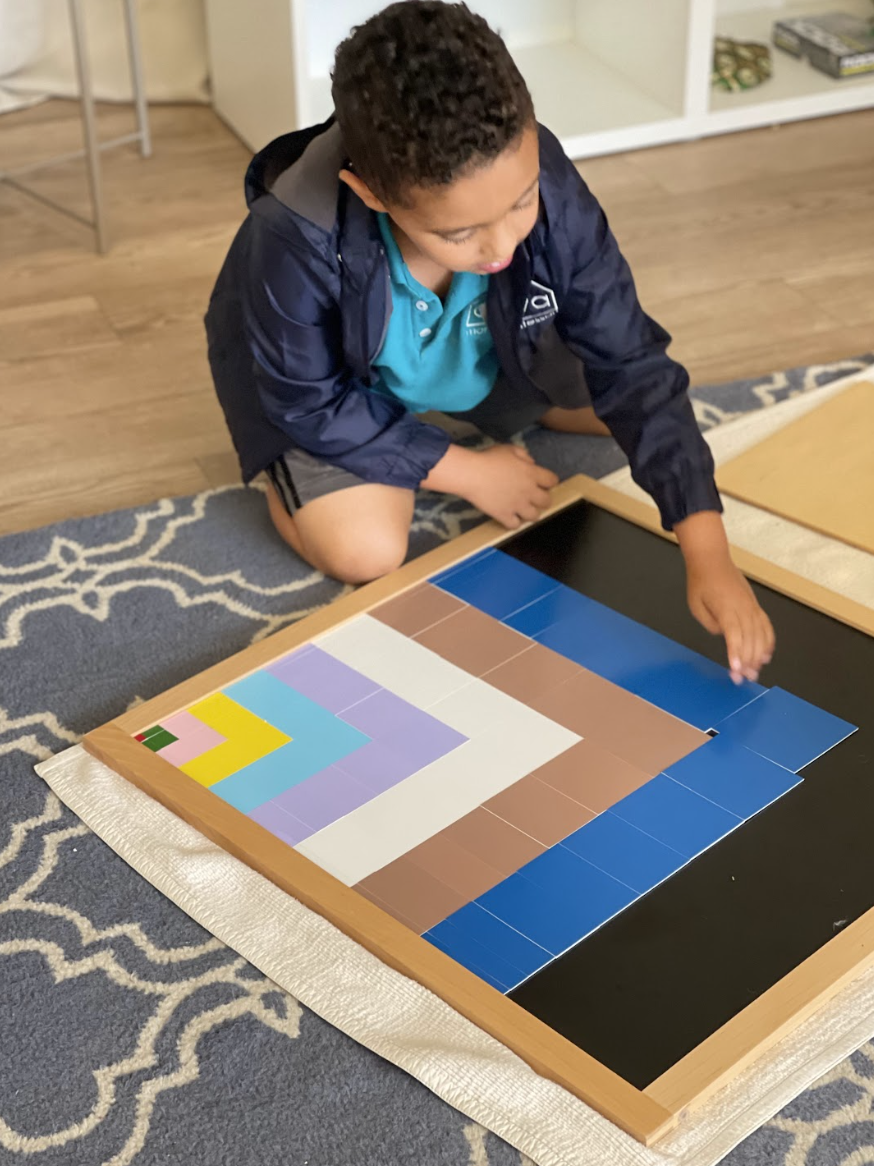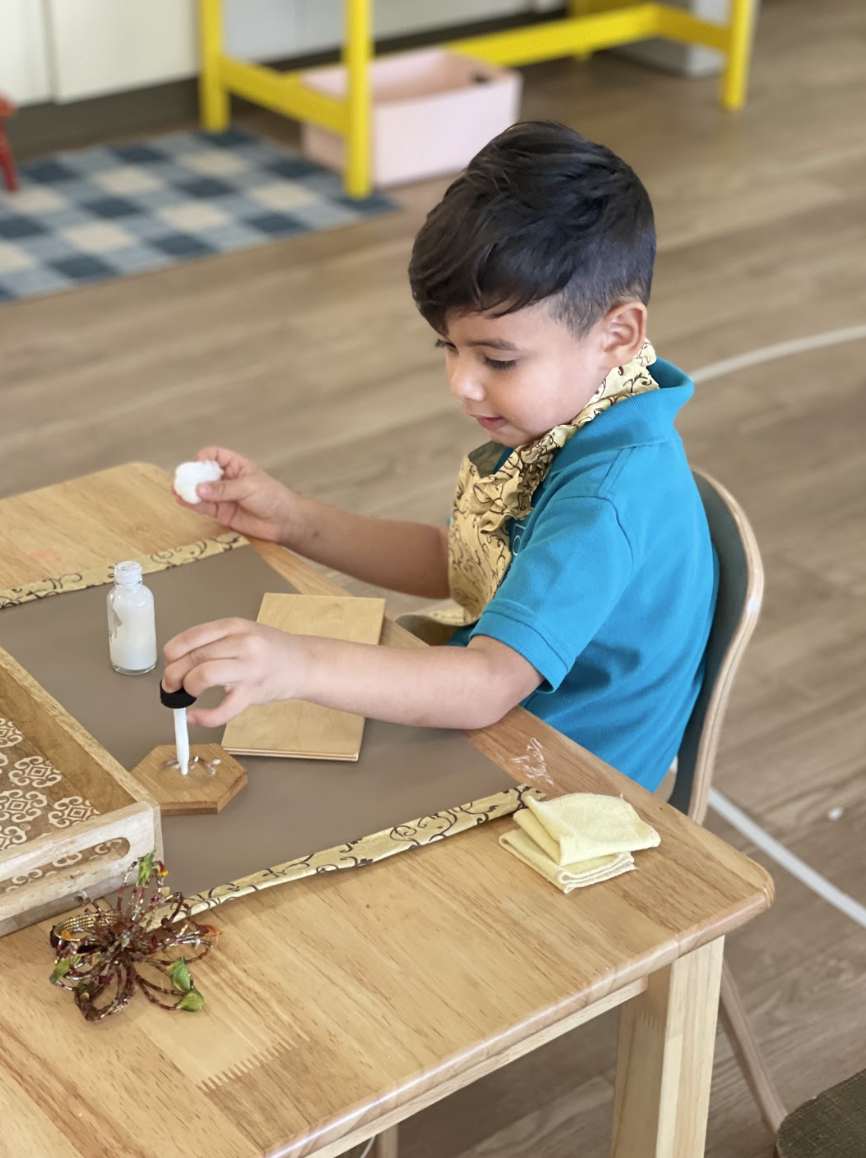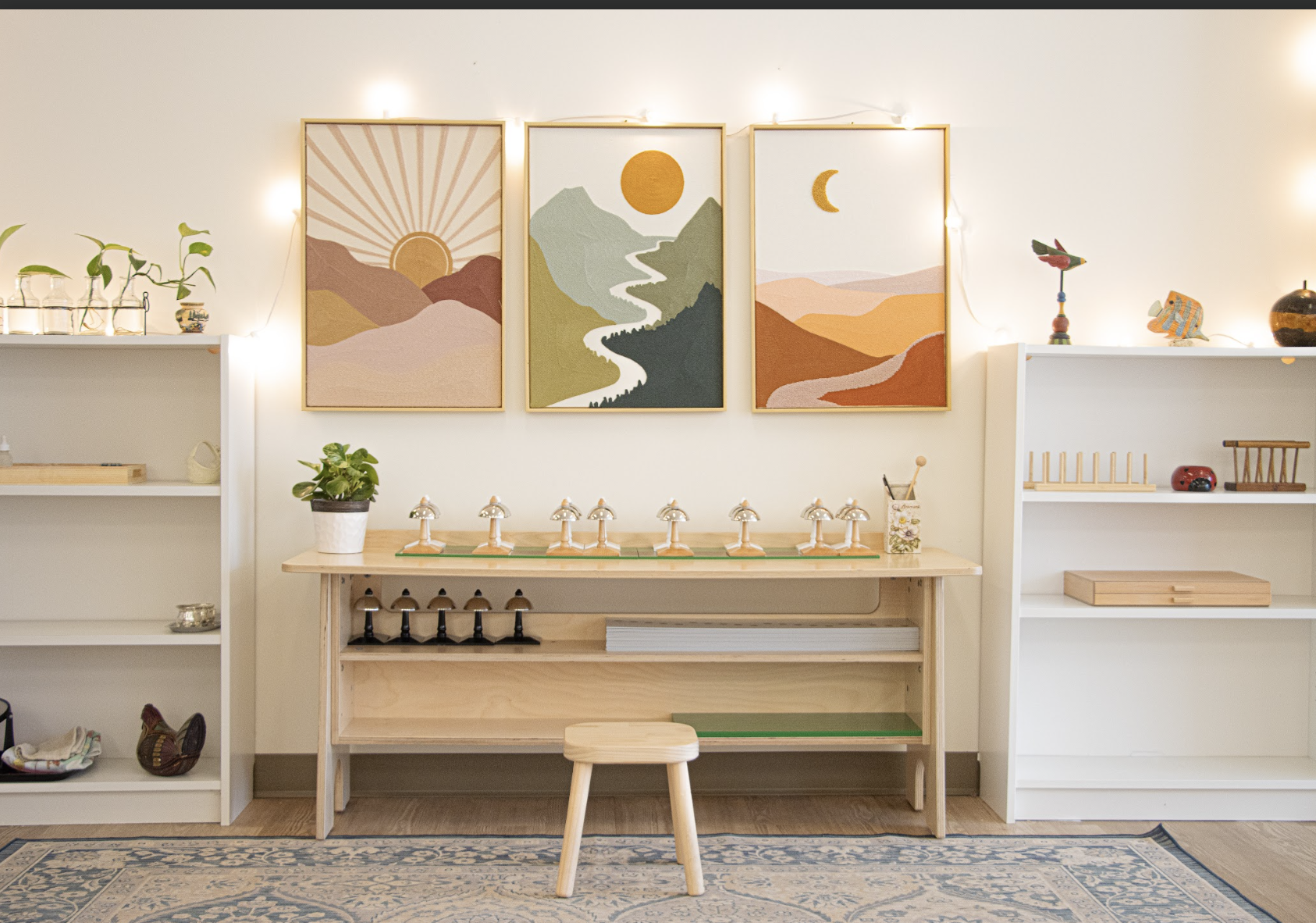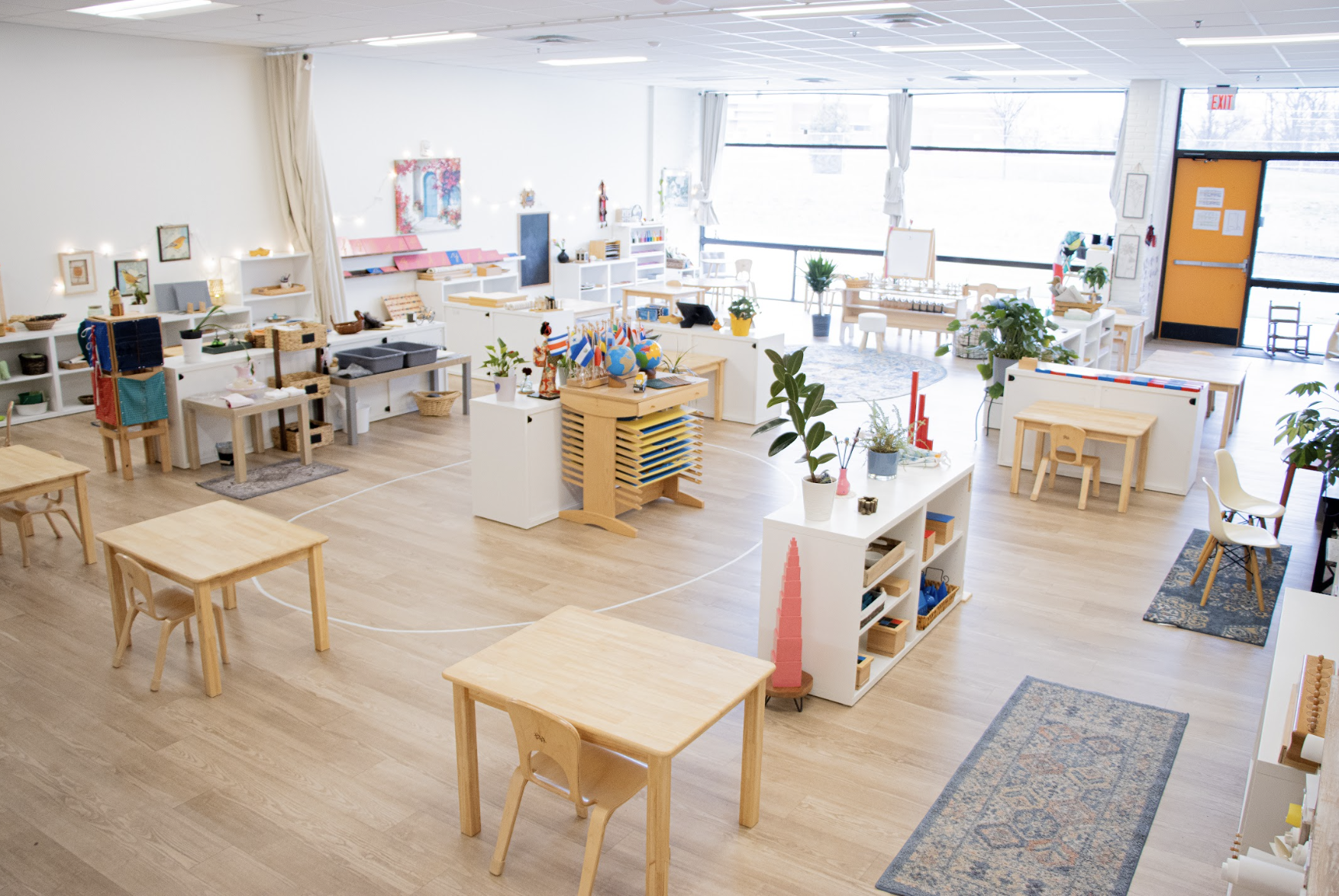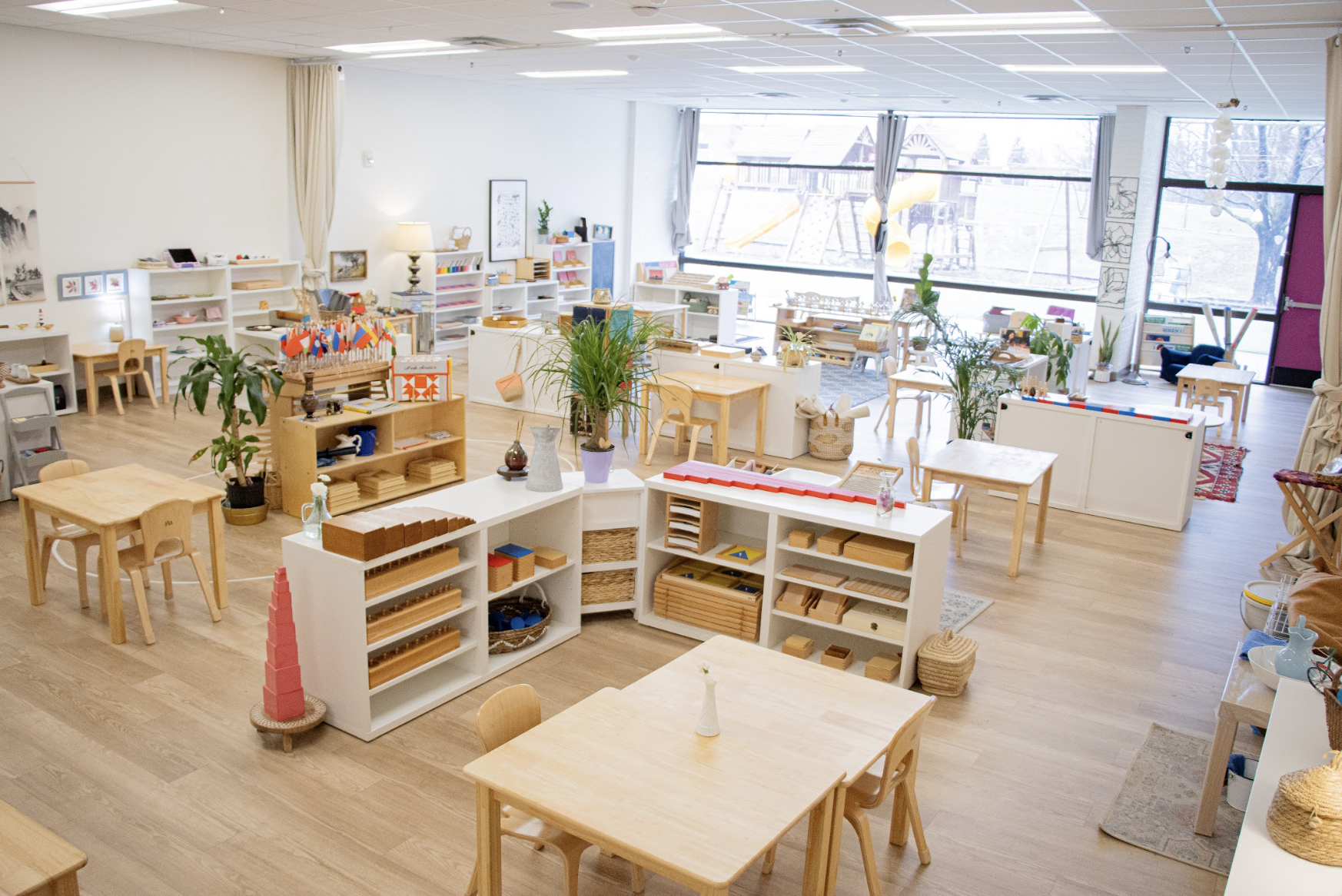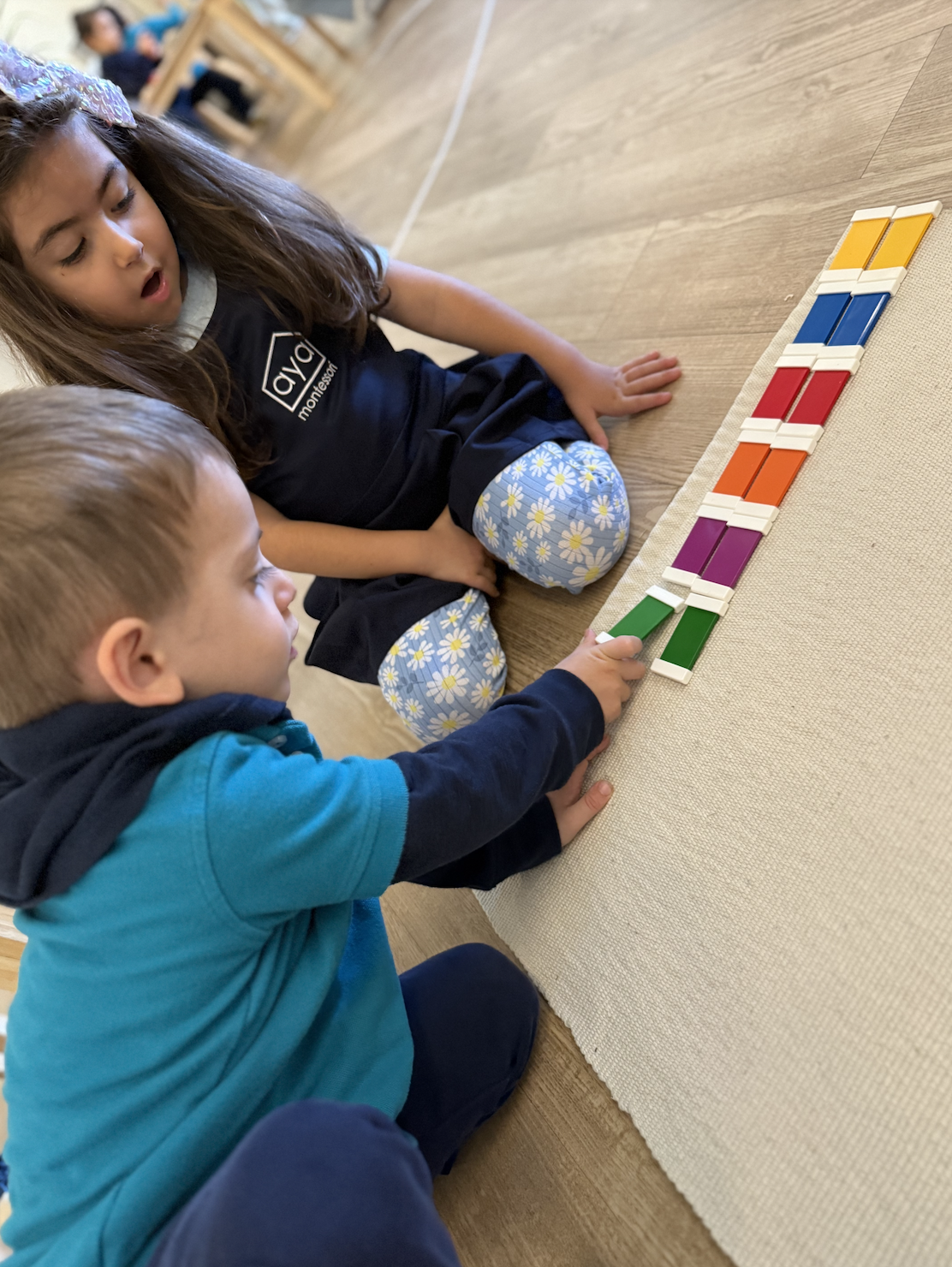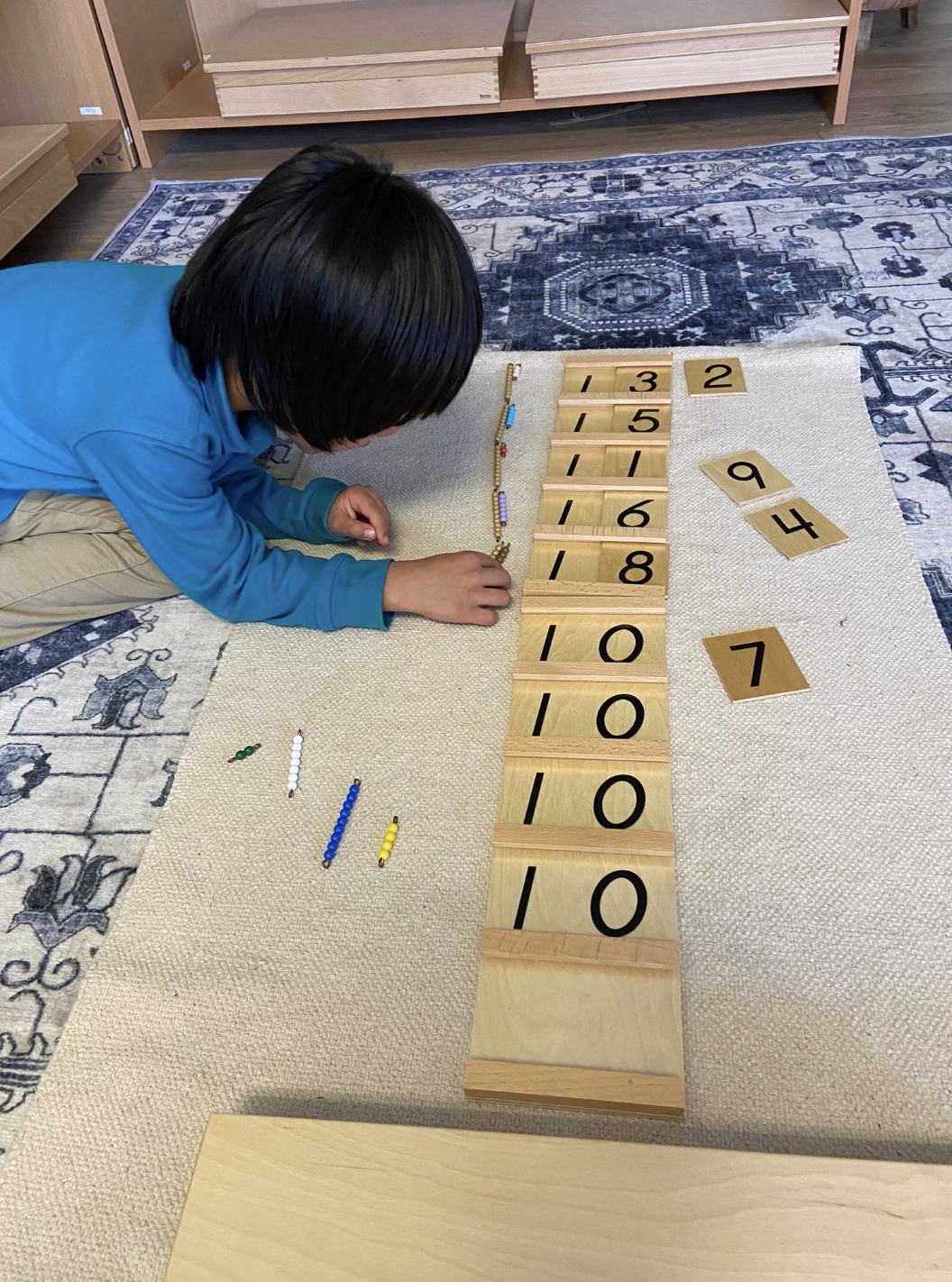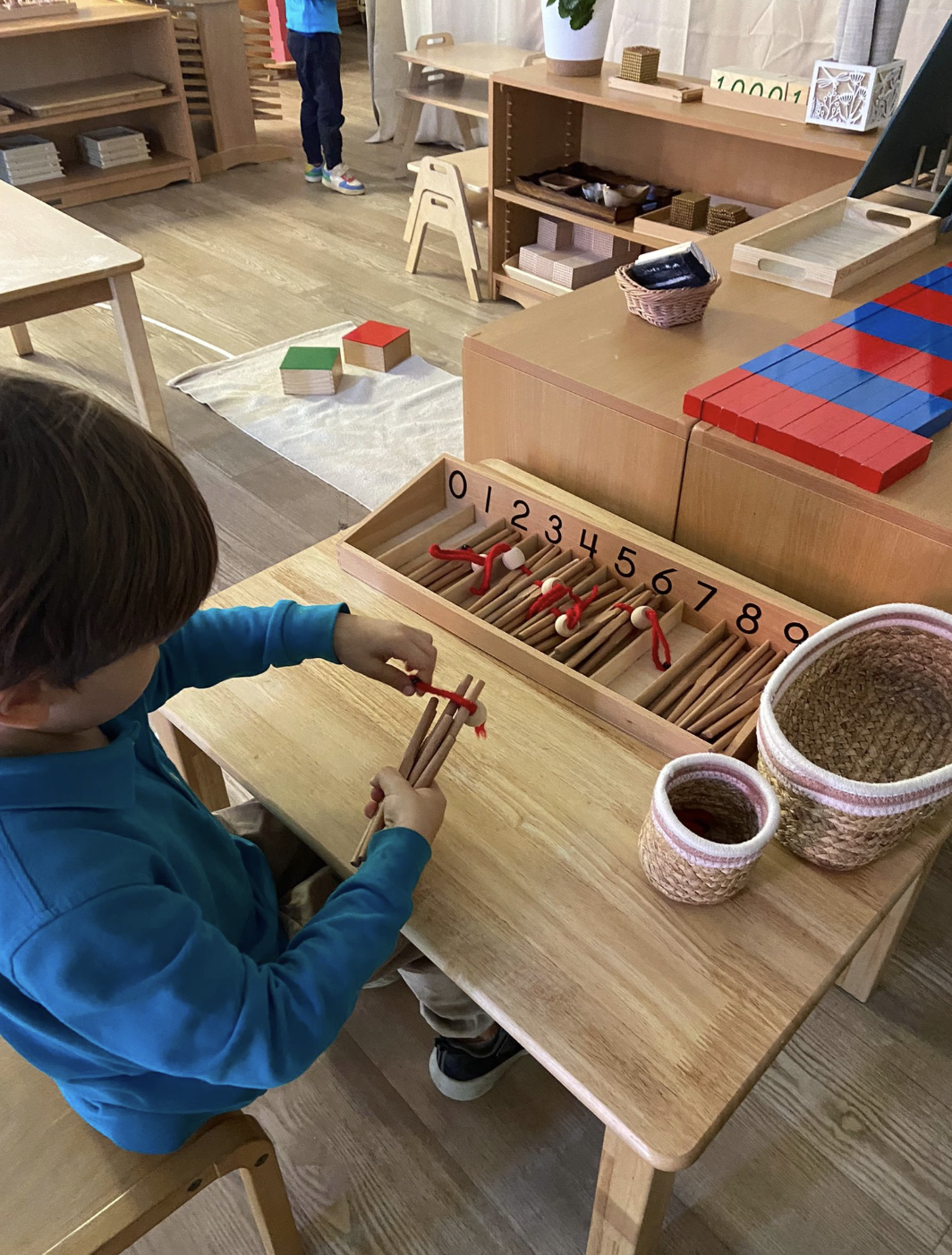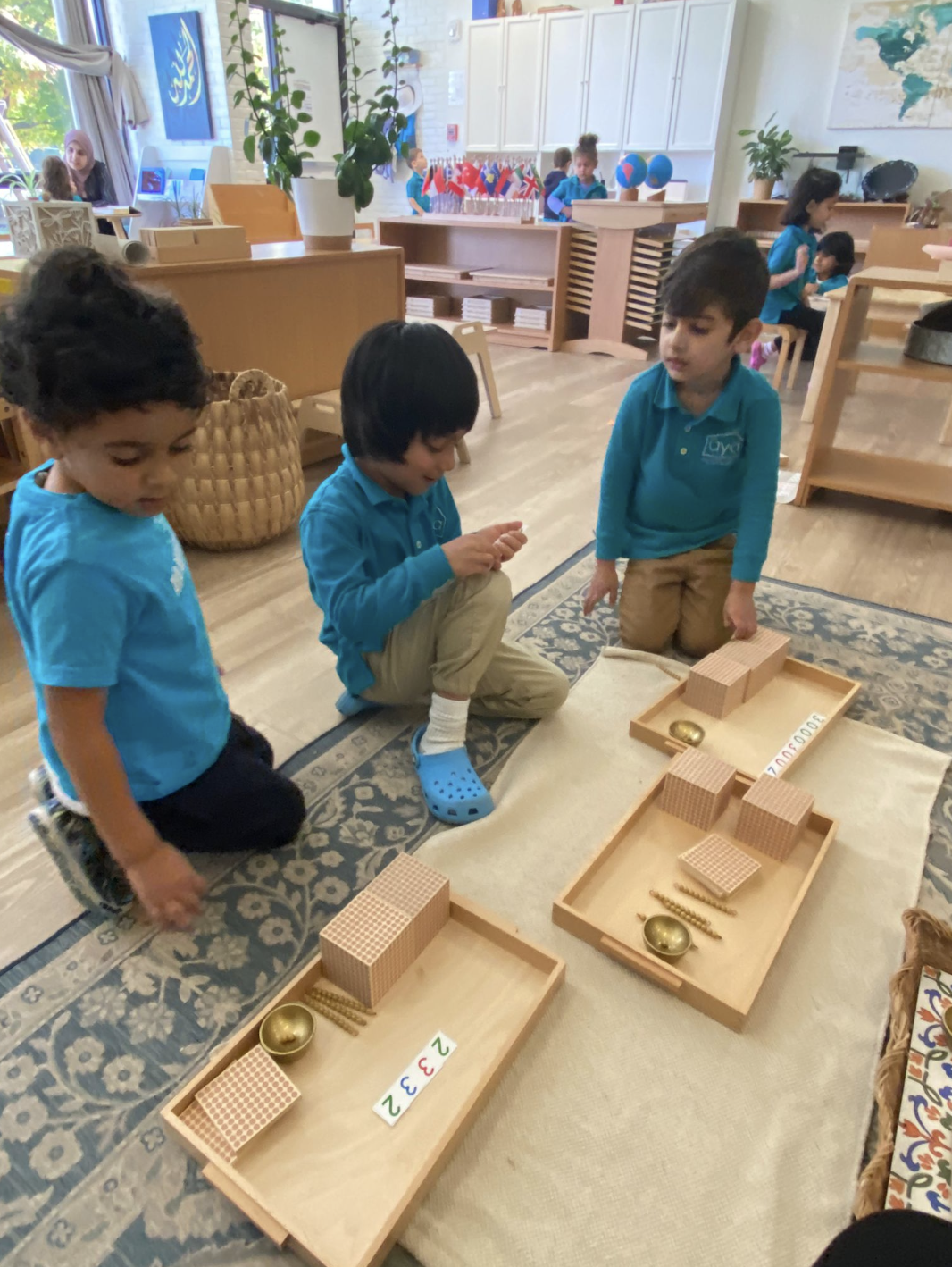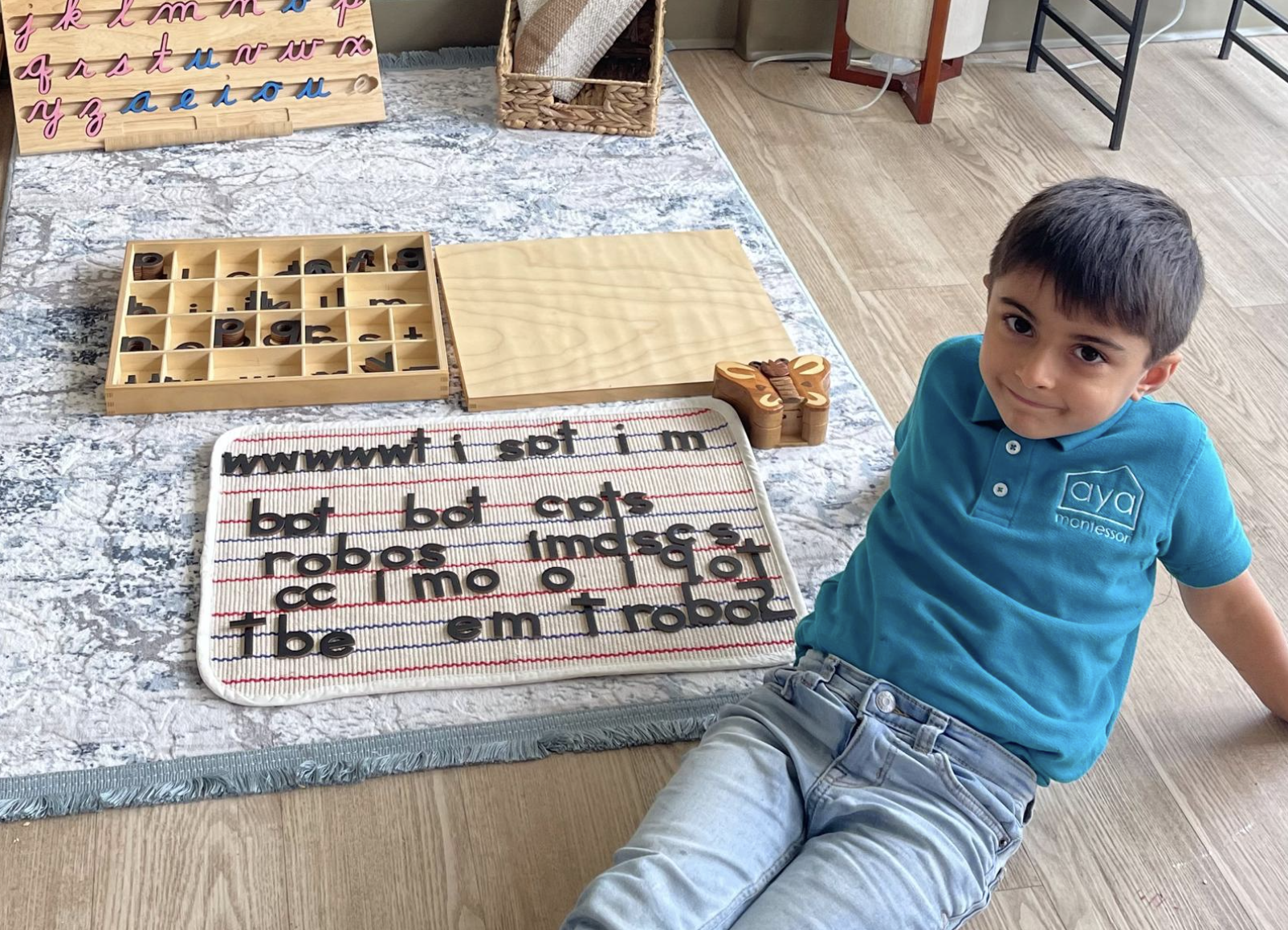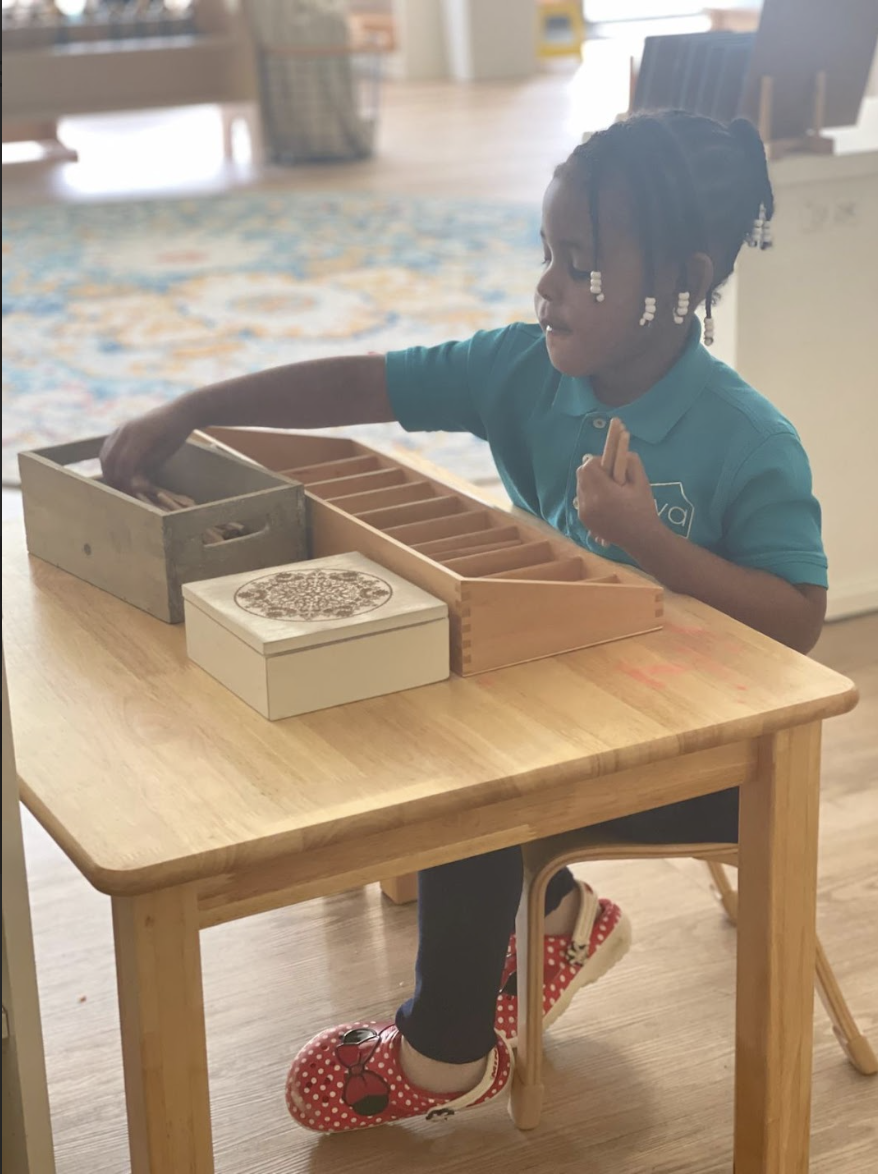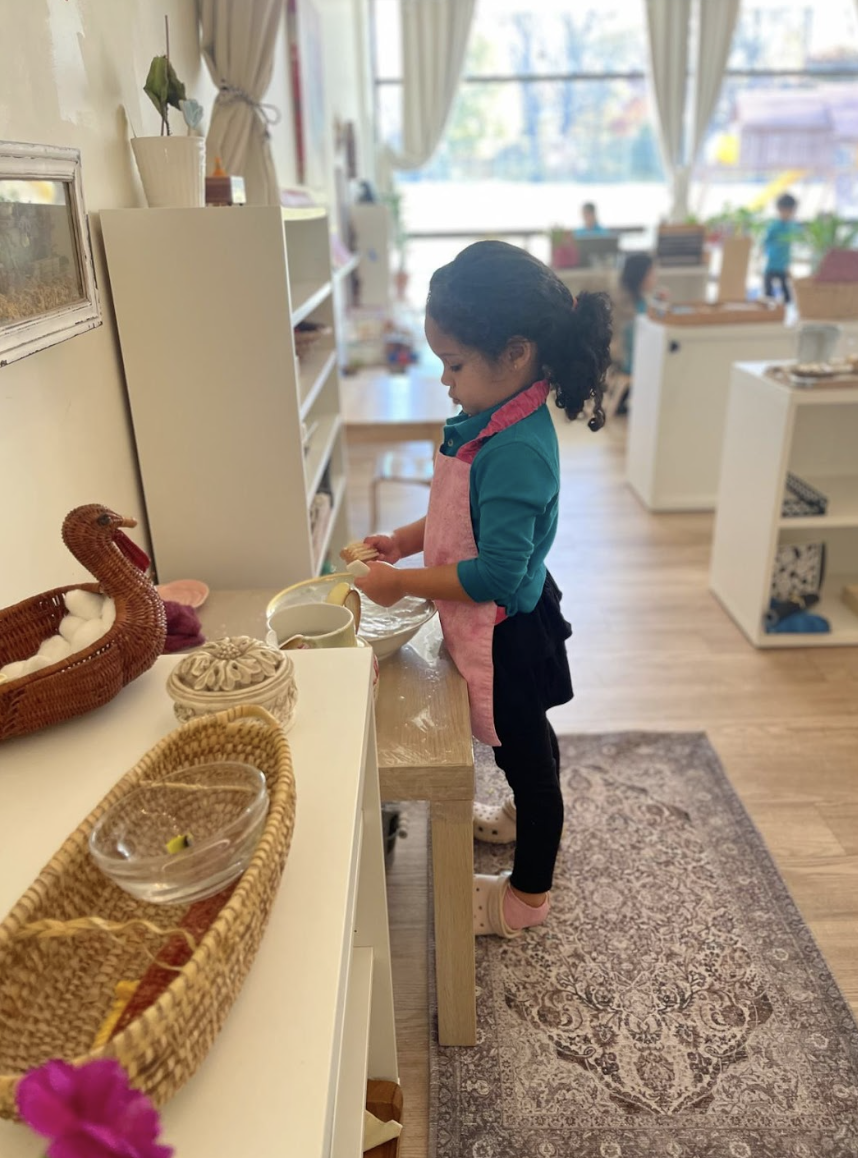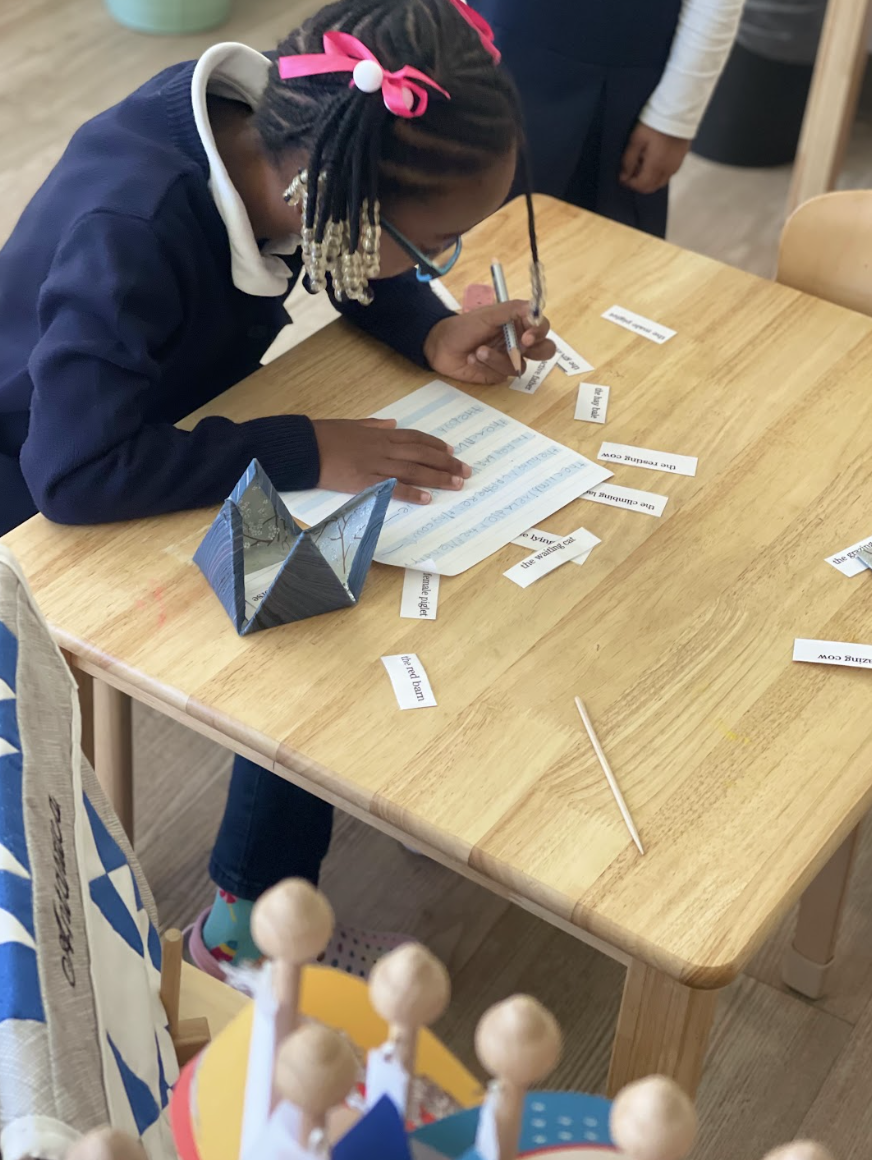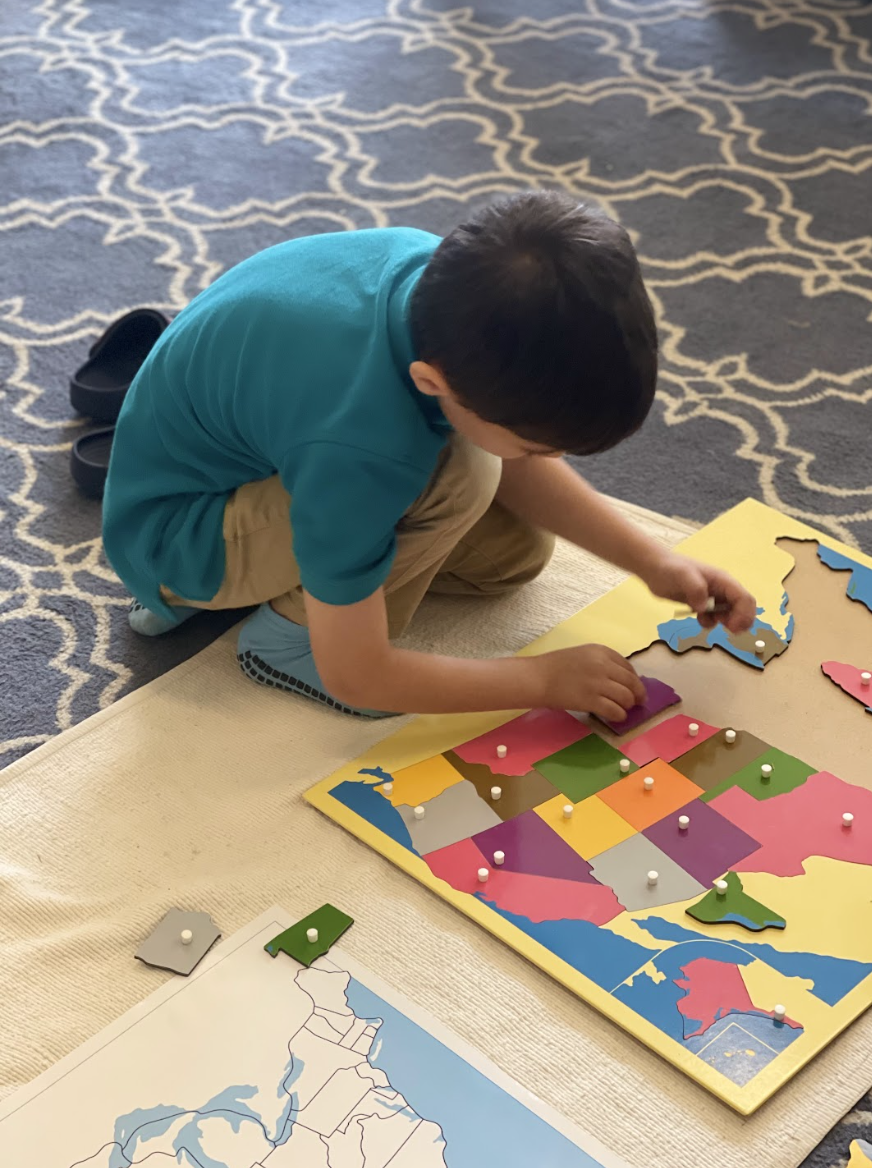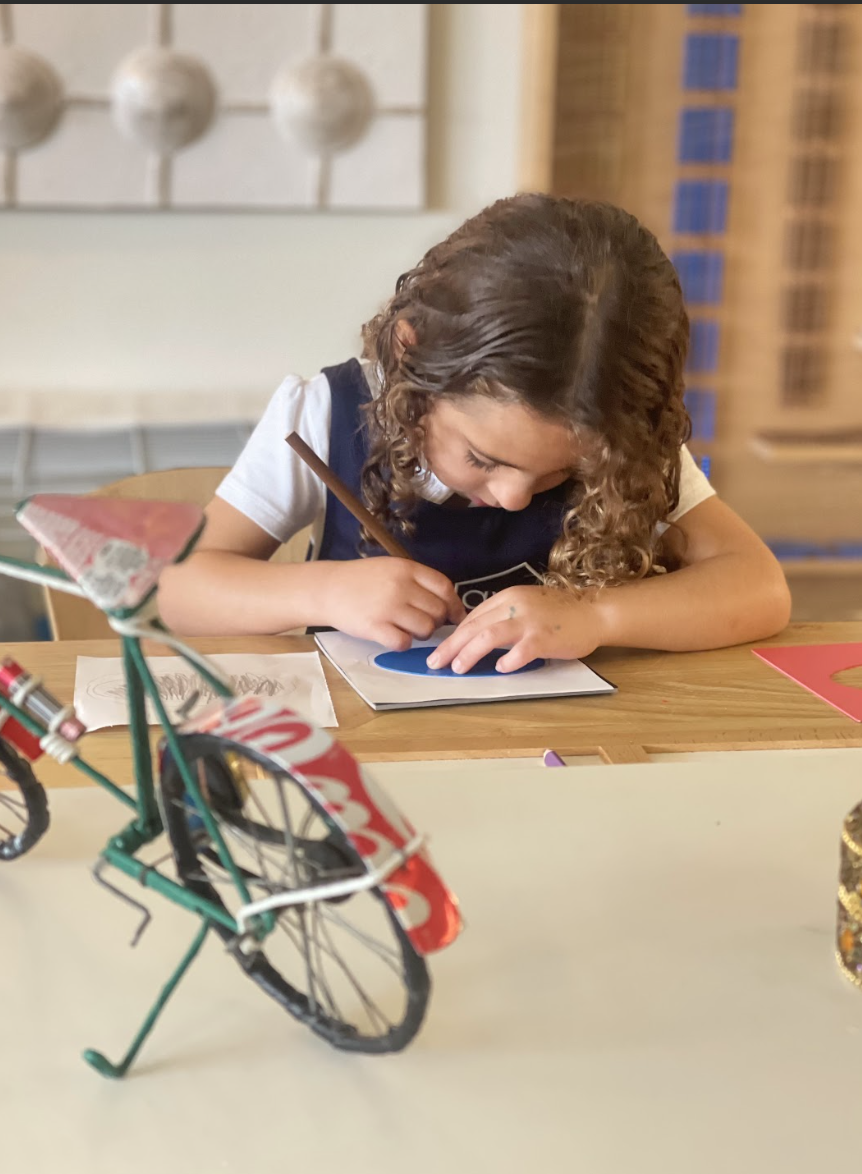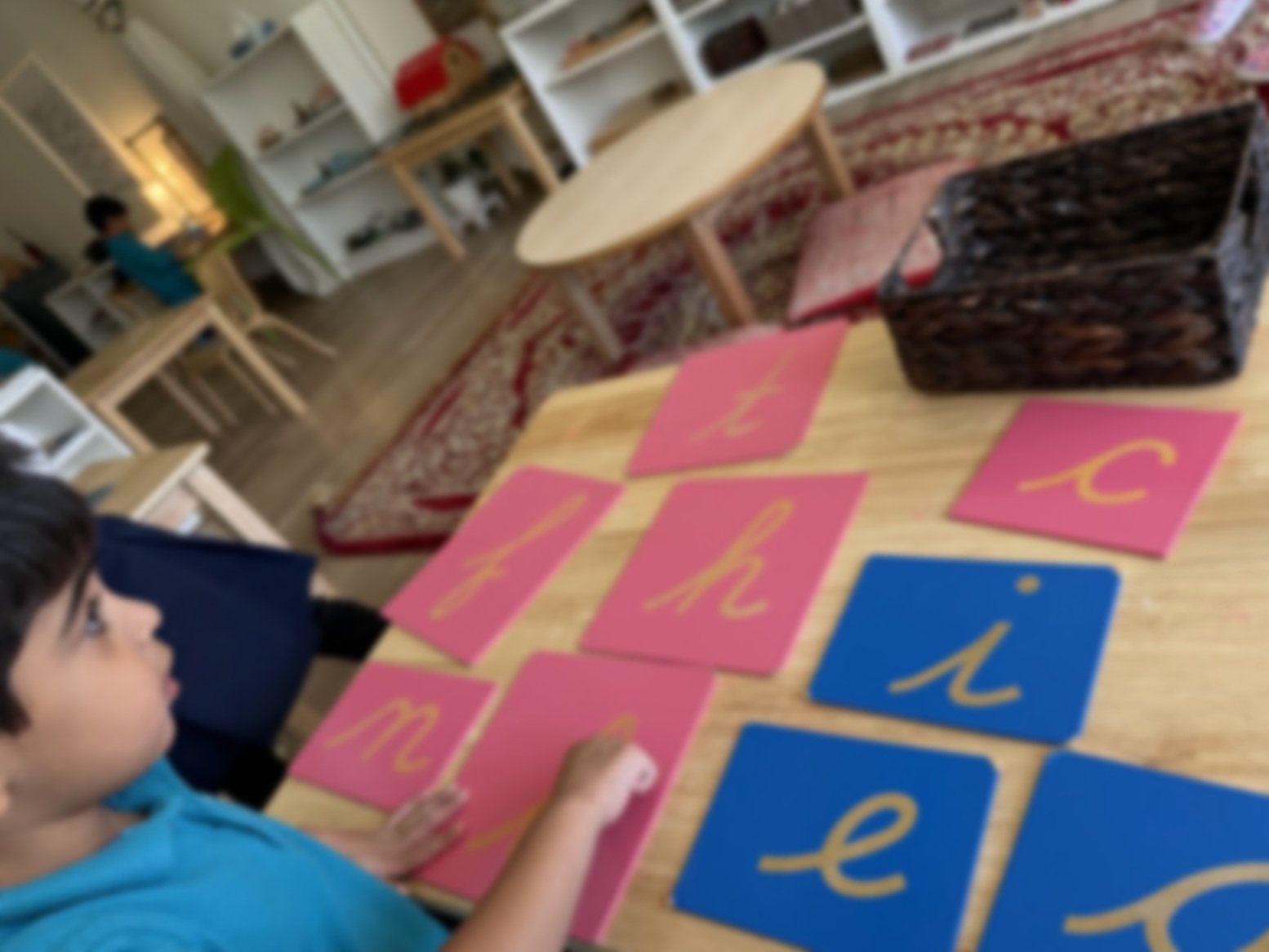
Primary community
Children’s House for Ages 3-6 Years
Primary Program Overview:
The Children’s House, also known as the Primary Community, is a vibrant learning environment for children aged three to six years. Within this carefully prepared space, children live and learn together, engaging in meaningful activities that support what Dr. Maria Montessori referred to as the child’s “work of self-construction.” This stage of development lays the foundation for independence, curiosity, and lifelong learning.
In the Children’s House, Montessori guides nurture each child’s ability to make thoughtful choices, sustain concentration, think critically, and express themselves creatively through language, art, and practical skills. This process helps children develop self-discipline, a sense of purpose, and a deep connection to their peers, fostering a cohesive and harmonious community.
Unlike traditional preschools, the Montessori Primary environment is thoughtfully designed to meet the developmental needs of young children. It includes areas of activity such as practical life, sensorial exploration, language, mathematics, and cultural studies. Each area is equipped with an extensive collection of hands-on materials that spark curiosity and inspire repeated engagement, enabling children to absorb complex concepts naturally and with joy. To explore the Primary Community further and learn more about areas of learning, please scroll down to the bottom of the page.
PRIMARY DETAILS:
Ages: Ages 3-6 yrs (Mixed-Age for Pre-K & KG)
Ratio: 1:10 with 3:27 max. (teacher:child)
Staff: 1 Montessori Guide + 1 Assistant + 1 Arabic/Quran Assistant
Enrollment: Full-Time Only - 10/or/12 months.
Communities: Blue, Purple, Green and Orange
Requirement:
Independence in Dressing, Eating, and Bathroom.
Priority is always given to children at age 3 who meet the independence requirement before older children.
Children enrolling at age 5 must have prior AMI-Montessori School experience to qualify.
Application for the new Academic Year opens January 1st at 8am
A new application is required each academic year for children not currently enrolled at Aya. We strongly recommend applying early, as spots are filled on a first-come, first-served basis. Families on the waitlist will be contacted when spaces become available. Current-year applications are accepted on a rolling basis, subject to availability and the waitlist.
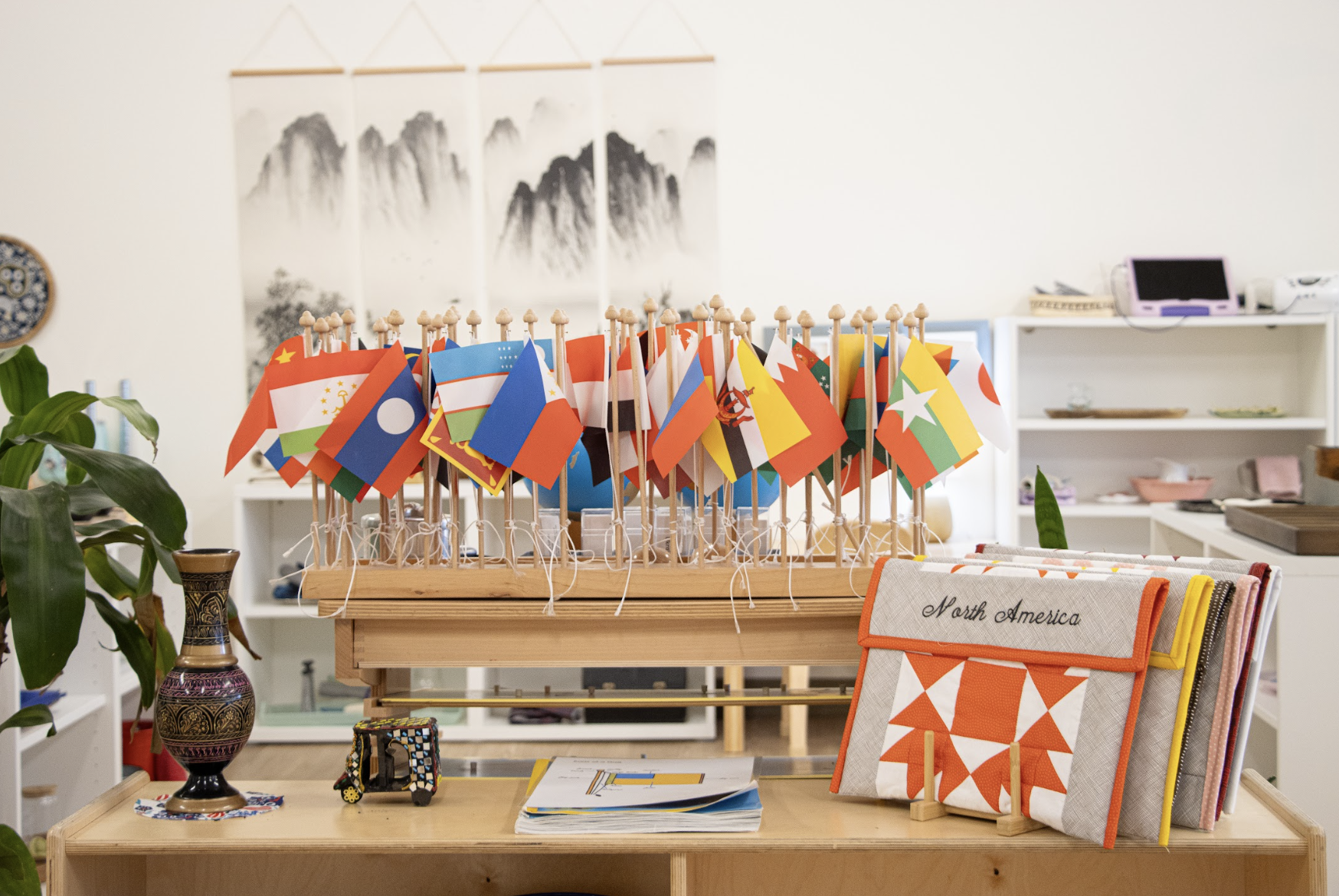
“The children of three years of age in the "Children's Houses" learn and carry out such work as sweeping, dusting, making things tidy, setting the table for meals, waiting at table, washing the dishes, etc ., and at the same time they learn to attend to their own personal needs, to wash themselves, to take showers, to comb their hair, to take a bath, to dress and undress themselves, to hang up their clothes in the wardrobe, or to put them in drawers, to polish their shoes. These exercises are part of the method of education, and do not depend on the social position of the pupils…. It is just – these "independent" children of ours who learn to write at the age of four and a half years, who learn to read spontaneously, and who amaze everyone by their progress in arithmetic.”
Maria Montessori | From Childhood to Adolescence, p. 66
PRIMARY LEARNING Overview:
Welcome to the Primary Community at Aya Montessori, where children embark on a journey of discovery, independence, and growth. Rooted in the Montessori philosophy, our program is carefully designed to nurture every aspect of your child’s development—cognitive, emotional, physical, and social. Through engaging, hands-on activities, children explore their environment, build foundational skills, and cultivate a love for learning.
Each learning area is supported by thoughtfully prepared environments, materials, and guidance from experienced Montessori educators. These experiences lay a strong foundation for your child’s academic, social, and emotional success.
Explore the detailed summaries of each learning area by clicking on the title to expand it and discover how we help children thrive in the Primary Community:
-
The Practical Life area in the Primary Community at Aya Montessori forms the cornerstone of the Montessori classroom, engaging children in purposeful, real-world activities that support their holistic development. These activities include everyday tasks such as cleaning, gardening, cooking, and organizing, all of which contribute to what Dr. Maria Montessori called the child’s “work of self-construction.”
Through carefully prepared materials and a thoughtfully designed environment, children participate in lessons that promote independence, coordination, and concentration. Key lessons include:
Care of Self: Activities like handwashing, dressing frames (buttons, zippers, etc.), and grooming foster personal independence and self-care skills.
Care of the Environment: Lessons such as sweeping, polishing, and plant care teach responsibility and respect for shared spaces.
Grace and Courtesy: Role-play activities introduce children to social behaviors, such as greeting others, saying "please" and "thank you," and sharing space harmoniously.
Practical Skills: Activities like pouring, spooning, and food preparation develop fine motor skills and prepare children for more complex tasks.
Materials in the Practical Life area are real, beautiful, and proportionally designed for children, emphasizing functionality and respect for their abilities. For instance, using a small glass pitcher instead of plastic fosters careful handling and concentration. These materials are organized with order and aesthetics in mind, encouraging children to develop a sense of routine and responsibility.
Montessori educators provide individual presentations to introduce these activities, using slow, deliberate movements and minimal language to emphasize precision. Children are encouraged to repeat activities as often as they wish, allowing them to internalize skills and build confidence. The guide’s role is to observe and subtly support the child’s unique developmental journey, fostering independence and self-discipline.
The Practical Life area is not merely a set of tasks; it is an avenue through which children develop essential life skills, cultivate focus, and experience the joy of purposeful work, laying a strong foundation for lifelong learning and engagement with the world around them.
-
The Sensorial area in the Primary Community at Aya Montessori is designed to refine the child’s senses, build intellectual clarity, and prepare for abstract thinking. By engaging in activities that isolate and refine specific sensory inputs—such as touch, sight, sound, smell, and taste—children enhance their ability to classify and organize the world around them. These materials foster concentration, reasoning, and an appreciation for details while laying a foundation for future learning in areas such as mathematics, language, and geometry. Additionally, Sensorial activities serve as keys to understanding the environment, stimulating curiosity and empowering children with the tools to explore and describe their surroundings.
Key Lessons in Sensorial
Visual Sense: Activities include the Pink Tower (grading by size), Color Tablets (matching and grading colors), and Geometry Cabinet (exploring shapes and patterns).
Tactile Sense: Materials like Touch Boards and Fabric Tablets help children refine their sense of touch and differentiate textures.
Auditory Sense: Sound Cylinders and The Bells enhance auditory discrimination, focusing on volume and pitch.
Olfactory and Gustatory Senses: Smelling Bottles and Tasting Bottles engage the senses of smell and taste, providing opportunities for matching and exploring subtle variations.
Stereognostic Sense: Activities such as the Mystery Bag and Geometric Solids encourage children to identify objects through touch, fostering sensory memory and spatial awareness.
Sensorial Materials provide children with tools to refine their senses, build cognitive clarity, and ignite their innate curiosity about the world. Through exploration and discovery, children gain a deeper understanding of their environment, developing skills that extend beyond the classroom and into their daily lives.
-
The Language area in the Primary Community at Aya Montessori is thoughtfully designed to nurture the child’s innate capacity for communication and expression. Language is seen as a vital instrument of collective thought, enabling children to communicate, understand, and connect with their environment and culture. The Montessori approach emphasizes the critical role of the sensitive period for language, making the early years an optimal time for acquiring the foundational skills of spoken and written language.
Language development begins with speech, as children naturally absorb and refine their understanding of language through interactions and experiences. This process is supported in the Montessori environment by a rich vocabulary, purposeful conversations, and grace and courtesy lessons. Writing is introduced before reading, allowing children to express themselves creatively while gaining an understanding of the symbolic representation of sounds. Reading follows, enabling children to decode and comprehend the thoughts and ideas of others.
Key Lessons in Language Development
Spoken Language:
Engaging in meaningful conversations to build confidence and communication skills.
Introducing specific vocabulary through three-period lessons and contextual activities.
Encouraging storytelling, poetry, and dialogue to enhance verbal expression.
Writing:
Developing sound awareness through the Sound Game.
Introducing sandpaper letters to connect sounds with symbols.
Using the Movable Alphabet as a precursor to pencil writing, enabling self-expression before fine motor skills are fully developed.
Incorporating cursive for personal writing due to its clarity and flow, while using print for reading materials.
Indirect Preparation for Writing:
Activities such as pouring, folding, and using dressing frames strengthen the pincer grip and prepare the hand for writing.
Exercises like tracing geometric shapes and using touch materials refine touch and control for lightness in writing.
Direct Preparation for Handwriting:
Metal insets are introduced to practice pencil control, develop creativity, and build a love for writing.
The Language area in Montessori provides children with the tools to explore and master communication in its many forms. By fostering their confidence and curiosity, this area supports the development of expressive and receptive language skills, paving the way for literacy and self-expression. Through meaningful engagement with spoken and written language, children are empowered to share their thoughts, ideas, and creativity with the world.
-
The Mathematics area in the Primary Community at Aya Montessori is rooted in the concept of the "mathematical mind," a term Maria Montessori borrowed from Blaise Pascal. This innate human tendency emphasizes precision, order, and logical thinking, all of which are naturally fostered in young children through hands-on, exploratory experiences. The Montessori approach to mathematics moves from concrete manipulation to abstract reasoning, ensuring that children internalize mathematical concepts in a meaningful and joyful way.
The progression in mathematics begins with indirect preparations in Practical Life and Sensorial activities, where children develop essential skills like concentration, order, and exactness. These foundational experiences prepare the child for formal mathematical learning, which is divided into six groups of materials: numbers 1-10, the decimal system, teens and tens, memorization of math facts, passage to abstraction, and an introduction to fractions.
Key Lessons in Mathematics
Numbers 1-10:
Children first explore quantities with materials like Number Rods, learning to associate quantities with numerals through Sandpaper Numbers and the Spindle Box.
Odd and even concepts are introduced with Numbers and Counters.
Decimal System and Operations:
Using Golden Beads, children explore the concept of units, tens, hundreds, and thousands, progressing to static and dynamic operations (addition, subtraction, multiplication, and division).
Tools like the Stamp Game and Dot Game further solidify understanding.
Teens and Tens:
Materials such as the Teen and Ten Boards highlight number composition and sequential counting up to 99, with bead chains introducing linear and skip counting, and preparing for multiplication.
Memorization of Math Facts:
Through games like the Snake Game and tools like the Addition Strip Board, children discover patterns and internalize math facts across operations.
Passage to Abstraction:
Advanced tools like the Bead Frames, Wooden Hierarchical Material, and Racks and Tubes support children in applying operations to large numbers, focusing on processes rather than rote answers.
Fractions:
Using hands-on fraction materials, children are introduced to the concept of parts of a whole, equivalence, and simple operations, providing a foundation for deeper exploration in Elementary.
The Mathematics area at Aya Montessori transforms abstract concepts into tangible, engaging experiences. By building confidence and curiosity through hands-on exploration, children develop a strong understanding of mathematical principles and patterns. This method ensures that children not only master mathematical operations but also gain the ability to apply logical and critical thinking in their daily lives, fostering a lifelong appreciation for mathematics.
-
The Cultural Studies curriculum at Aya Montessori encompasses art, music, geography, and science, providing an integrated approach to understanding the world. Drawing upon materials and methods from language, sensorial, and practical life areas, this program inspires exploration, creativity, and a deeper connection to nature, culture, and human development.
Art
Art fosters creativity and fine motor skills while introducing children to elements such as line, color, and form. Activities include drawing, painting, collage, and sculpting, emphasizing the process over the outcome. Art appreciation involves observing famous works, discussing their visual elements, and comparing styles, enhancing children’s ability to notice patterns and beauty.
Music
Music education cultivates auditory sensitivity and appreciation for rhythm, melody, harmony, and tone. Using Montessori Bells, children learn musical notation, composition, and even simple performance. Listening to diverse cultural music broadens their understanding, while interactive activities like singing and playing instruments promote creative expression and collaboration.
Geography
The geography curriculum introduces physical and cultural geography through hands-on materials. Tools such as sandpaper globes, painted globes, and puzzle maps help children explore continents, countries, and land and water forms. Geography folders and cultural cards encourage discussions about landmarks, animals, traditions, and clothing, fostering appreciation for global diversity. Activities like map-making refine spatial awareness and handwriting, while integrating lessons from practical life and language.
Science
Science in the Montessori classroom is experiential, sparking curiosity and discovery. Lessons focus on understanding the natural world and include exploring scientific classifications such as land and water forms, plant and animal life, and basic physical phenomena. Hands-on activities with cards, labeled pictures, and definitions introduce children to biological, geographical, and environmental concepts, while fostering critical thinking and observation skills. Activities are structured to build reading fluency and vocabulary alongside scientific knowledge, preparing children for deeper exploration in later stages.
Cultural Studies at Aya Montessori provides a well-rounded, interdisciplinary approach that enriches the child’s understanding of art, music, geography, and science. This integrated program nurtures creativity, critical thinking, and a sense of interconnectedness, laying a strong foundation for lifelong curiosity and learning.
-
Arabic
The Arabic curriculum at Aya Montessori is thoughtfully designed to balance vocabulary enrichment, reading, and comprehension using Montessori-inspired materials and methods. The program follows a structured progression, starting with sound recognition and letter shapes and advancing to connecting letters, forming words, and eventually reading sentences. Vocabulary is drawn from themes such as animals, nature, family, and daily life, fostering relevance and cultural appreciation. Children also engage with classified cards, poems, songs, and books to deepen their understanding and connection to the Arabic language. Native-speaking assistants immerse children in conversational Arabic daily, ensuring both fluency and confidence in communication.
Islam
Islamic education at Aya Montessori nurtures a love for faith and connection with the Creator ﷻ in an age-appropriate way. The curriculum emphasizes core Islamic values and practices, including the pillars of Iman (faith) and Islam. Children learn through hands-on materials, nasheed (songs), daily duaa (prayers), Sunnah (Prophetic traditions), and etiquettes of daily actions like greetings, eating, and sleeping. This holistic approach provides children with opportunities to internalize Islamic values and practice them in a positive and peaceful environment.
Quran
The Quran curriculum aims to build a deep and loving connection between children and the Quran from their earliest years. Children start by learning the sounds of Arabic letters before progressing to memorizing short surahs (chapters) and developing their recitation skills. A certified Quran instructor works one-on-one with each child, ensuring individualized attention and allowing children to progress at their own pace. The program focuses on fostering an appreciation for the Quran and instilling its values in the child’s heart, laying a strong foundation for lifelong engagement with the sacred text.
This integrated approach to Arabic, Islam, and Quran reflects Aya Montessori’s commitment to holistic education, nurturing the spiritual, linguistic, and cognitive development of each child.
PRIMARY SCHEDULE:
7-8am | Morning Care (Registration Needed)
8-8:30am | Arrival Window (No late drop off)
8-11am | Morning Learning (Work) Cycle + AM Snack
11-11:15am | Circle Time + Transition
11:15am-12pm | Recess: Outdoor Play + Sports
12-1pm | Lunch Time + Clean-up
1-2:30pm | Children under 5: Nap Time
1-2:30pm | Children Ages 5+: Afternoon Learning Cycle
2:30-3pm | Wake up, Toileting, and PM Snack
3-3:30pm | Arabic Circle Time (Stories, and Songs)
3:30-4pm | Drive-by Dismissal
3:30-5pm | Aftercare: Open Play (Registration Needed)
SCHOOL CLOSES AT 5PM. ALL CHILDREN MUST BE PICKED UP BY 4:59PM MAX.
